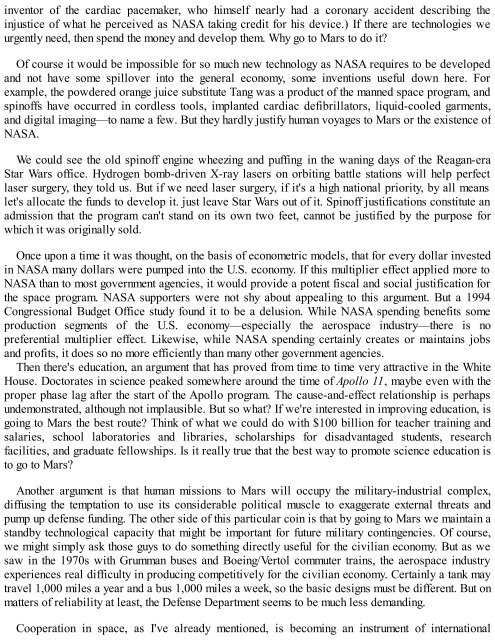Pale Blue Dot ( PDFDrive.com ) (1)
Create successful ePaper yourself
Turn your PDF publications into a flip-book with our unique Google optimized e-Paper software.
inventor of the cardiac pacemaker, who himself nearly had a coronary accident describing the<br />
injustice of what he perceived as NASA taking credit for his device.) If there are technologies we<br />
urgently need, then spend the money and develop them. Why go to Mars to do it?<br />
Of course it would be impossible for so much new technology as NASA requires to be developed<br />
and not have some spillover into the general economy, some inventions useful down here. For<br />
example, the powdered orange juice substitute Tang was a product of the manned space program, and<br />
spinoffs have occurred in cordless tools, implanted cardiac defibrillators, liquid-cooled garments,<br />
and digital imaging—to name a few. But they hardly justify human voyages to Mars or the existence of<br />
NASA.<br />
We could see the old spinoff engine wheezing and puffing in the waning days of the Reagan-era<br />
Star Wars office. Hydrogen bomb-driven X-ray lasers on orbiting battle stations will help perfect<br />
laser surgery, they told us. But if we need laser surgery, if it's a high national priority, by all means<br />
let's allocate the funds to develop it. just leave Star Wars out of it. Spinoff justifications constitute an<br />
admission that the program can't stand on its own two feet, cannot be justified by the purpose for<br />
which it was originally sold.<br />
Once upon a time it was thought, on the basis of econometric models, that for every dollar invested<br />
in NASA many dollars were pumped into the U.S. economy. If this multiplier effect applied more to<br />
NASA than to most government agencies, it would provide a potent fiscal and social justification for<br />
the space program. NASA supporters were not shy about appealing to this argument. But a 1994<br />
Congressional Budget Office study found it to be a delusion. While NASA spending benefits some<br />
production segments of the U.S. economy—especially the aerospace industry—there is no<br />
preferential multiplier effect. Likewise, while NASA spending certainly creates or maintains jobs<br />
and profits, it does so no more efficiently than many other government agencies.<br />
Then there's education, an argument that has proved from time to time very attractive in the White<br />
House. Doctorates in science peaked somewhere around the time of Apollo 11, maybe even with the<br />
proper phase lag after the start of the Apollo program. The cause-and-effect relationship is perhaps<br />
undemonstrated, although not implausible. But so what? If we're interested in improving education, is<br />
going to Mars the best route? Think of what we could do with $100 billion for teacher training and<br />
salaries, school laboratories and libraries, scholarships for disadvantaged students, research<br />
facilities, and graduate fellowships. Is it really true that the best way to promote science education is<br />
to go to Mars?<br />
Another argument is that human missions to Mars will occupy the military-industrial <strong>com</strong>plex,<br />
diffusing the temptation to use its considerable political muscle to exaggerate external threats and<br />
pump up defense funding. The other side of this particular coin is that by going to Mars we maintain a<br />
standby technological capacity that might be important for future military contingencies. Of course,<br />
we might simply ask those guys to do something directly useful for the civilian economy. But as we<br />
saw in the 1970s with Grumman buses and Boeing/Vertol <strong>com</strong>muter trains, the aerospace industry<br />
experiences real difficulty in producing <strong>com</strong>petitively for the civilian economy. Certainly a tank may<br />
travel 1,000 miles a year and a bus 1,000 miles a week, so the basic designs must be different. But on<br />
matters of reliability at least, the Defense Department seems to be much less demanding.<br />
Cooperation in space, as I've already mentioned, is be<strong>com</strong>ing an instrument of international


